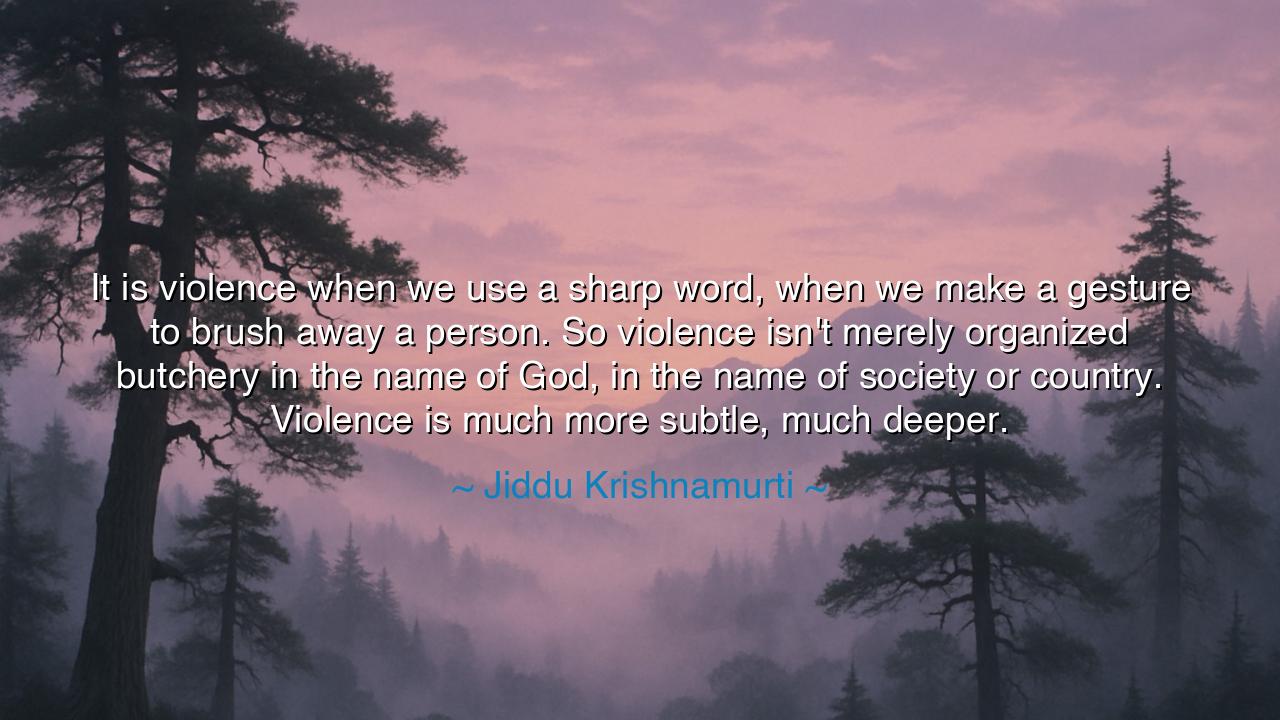
It is violence when we use a sharp word, when we make a gesture
It is violence when we use a sharp word, when we make a gesture to brush away a person. So violence isn't merely organized butchery in the name of God, in the name of society or country. Violence is much more subtle, much deeper.






"It is violence when we use a sharp word, when we make a gesture to brush away a person. So violence isn't merely organized butchery in the name of God, in the name of society or country. Violence is much more subtle, much deeper." These wise words from Jiddu Krishnamurti challenge us to look beyond the surface of what we often call violence. We tend to think of violence only in its most visible and dramatic form—wars, battles, the bloodshed of conflict. But Krishnamurti, in his profound insight, calls our attention to the subtle violence that pervades our everyday lives. Violence, he suggests, is not merely the organized brutality that we see on the battlefield or in the name of religion, society, or patriotism. It is the everyday acts of disrespect, dismissal, and cruelty that are often veiled in the fabric of our thoughts, words, and actions. Violence, at its core, is an act of separation, an attempt to diminish or harm another being, whether physically, mentally, or emotionally.
In the ancient world, the greatest philosophers understood that true violence was not just the clash of swords or the spilling of blood. The Greeks, especially in their philosophical traditions, warned against the violence that stems from the mind. Plato in his dialogues cautioned against the violence of ignorance, of minds blinded by prejudice, and urged the people to seek wisdom as the antidote to such harm. He spoke of the destructive force of disharmony, of minds that were not in accord with one another, for these internal violences—these disruptions of peace—could cause the greatest harm to both individuals and societies. The ancients recognized that the soul of a society could be torn apart not just by wars, but by the subtle violences of division, disdain, and the exploitation of the weak.
Krishnamurti’s words call us to reflect on this same truth—violence is not merely external; it begins within. The sharp word, the dismissive gesture, the act of brushing someone away as if they are insignificant—all these are acts of violence that we often overlook. And yet, they are as harmful as the most brutal acts of physical force. Just as the small crack in a dam, unnoticed at first, can eventually cause the entire structure to collapse, so too can these subtle acts of violence erode the trust, the dignity, and the compassion that hold us together as human beings. Violence is not just the war that ravages a country; it is the subtle violence of isolation, the rejection of another person’s humanity, and the constant reaffirmation of our separation from one another.
The story of Mahatma Gandhi, who led India's struggle for independence, offers us a powerful example of this deeper understanding of violence. Gandhi believed that non-violence—or ahimsa—was not simply the absence of physical harm but the absence of all forms of harm, whether physical, verbal, or emotional. He understood that even the most subtle acts of violence—the cutting words, the acts of contempt, the dismissal of others as lesser—were as damaging as the most violent acts of war. Gandhi’s nonviolent resistance was not just a political strategy; it was a way of living in which every word, every thought, and every action was chosen with the intent to foster unity, understanding, and compassion. In this way, he sought to break the cycle of violence, not just between nations, but within the hearts of all people.
But Krishnamurti’s insight extends even further, urging us to recognize that violence is not only an external force. It is often driven by our inner turmoil, by our fear, and by our inability to understand ourselves and each other. We often lash out at others, dismiss them, or harm them in subtle ways because we are afraid—afraid of vulnerability, afraid of being hurt, or afraid of losing control. This fear can lead us to create barriers, to shut others out, and to discredit their humanity. It is this inner violence, born of ignorance and fear, that perpetuates the cycle of harm that we see in the world today. The discrimination, the hatred, the violence of oppression—all are symptoms of a deep-seated fear that resides within us.
Krishnamurti’s lesson for us is clear: to be truly free from violence, we must begin with ourselves. Violence is not something that exists only in the realm of external acts. It is something that lives within our own hearts. If we wish to build a world of peace, we must first seek peace within ourselves—by being mindful of our thoughts, our words, and our actions. We must cultivate a deep awareness of the subtle violences we commit, often without even realizing it. Only through this self-awareness can we begin to shift the way we interact with others, to choose compassion and understanding over fear and rejection.
So let us walk through the world with the understanding that violence is not just the external clash of weapons but the subtle disdain, the dismissal, and the unspoken harm we inflict on others. Let us strive to cultivate compassion and understanding in our words, our gestures, and our actions. For it is only by recognizing the depth of violence within ourselves that we can break free from its grip and build a world grounded in peace and love. The true path to healing, to transformation, and to the creation of a just world begins not with grand gestures of political change, but with the simple choice to stop the subtle violence in our hearts and minds.






AAdministratorAdministrator
Welcome, honored guests. Please leave a comment, we will respond soon